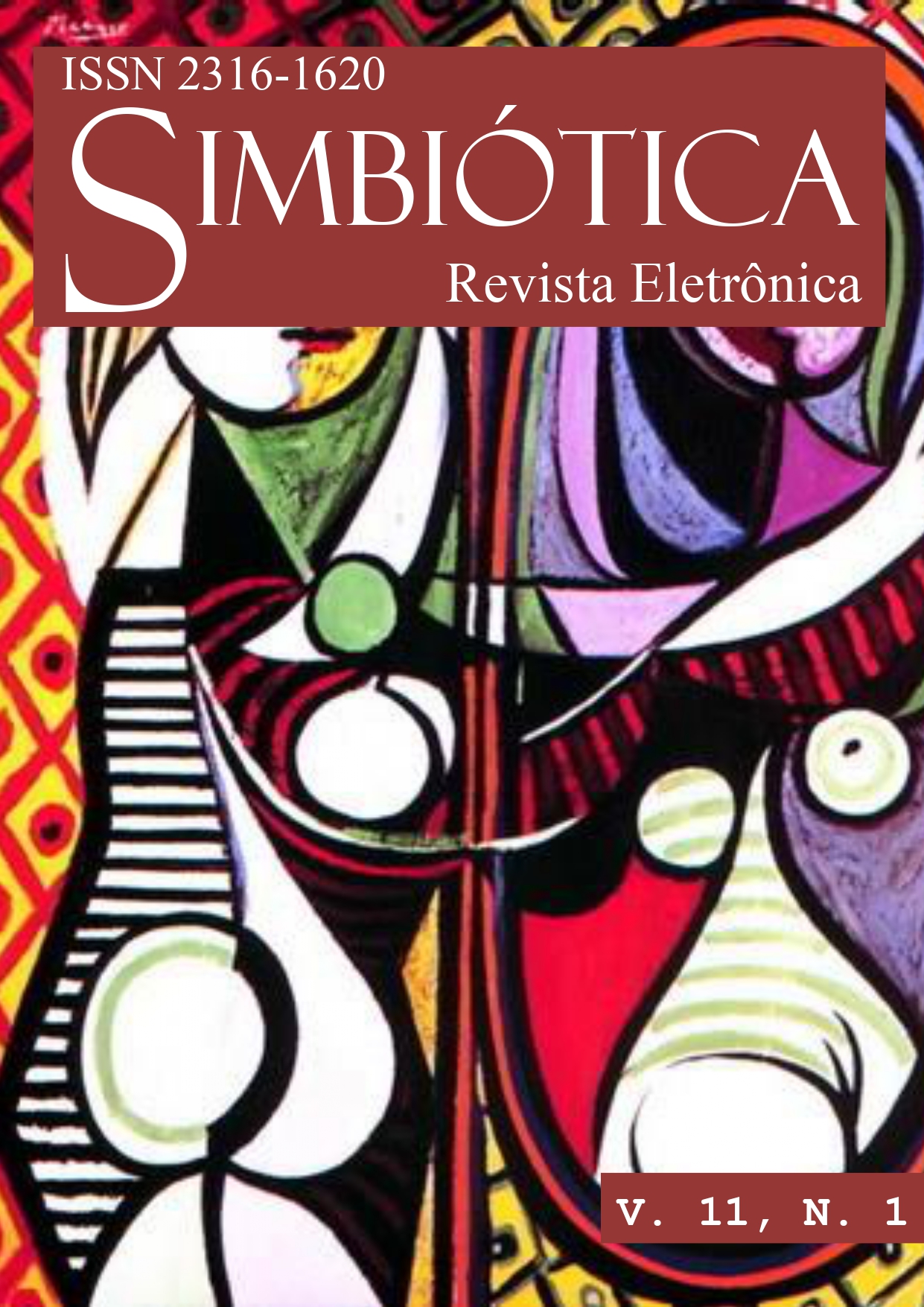The unheimlich and the contemporary aesthetic-political paradigm: methodology and thoughts on the inhuman implications of our everyday life
The unheimlich and the contemporary aesthetic-political paradigm: methodology and thoughts on the inhuman implications of our everyday life
DOI:
https://doi.org/10.47456/simbitica.v11i1.44758Keywords:
uncanny, Lacan, Freud, anguishAbstract
This text aims to investigate the unheimlich, feeling present in Freud's 1919 text, using the interpretation made by Lacan to develop his object a to defend the aspect present in this investigation in a possible method for psychoanalysis in the face of suffering, anguish and malaise in situations of indetermination. Within conceiving the unheimlich under Lacanian lenses, there is a clinical method that allows a dialectical movement in psychoanalysis to deal with the creation of a necessary grammar for an experience of subjective suffering.
Downloads
References
Andreoni, Leilane; Gonsalves, Rodrigo. (2023). “Existências espectrais: dimensões estético filosóficas do inominável no texto unheimlich de Freud”. Revista Linguagem em pauta, v. 3, n. 1, pp. 67-81.
Dolar, Mladen. (2018). “Eu estarei com você em sua noite de núpcias”, in Gonsalves, Rodrigo; Penha, Diego (orgs.), Ensaios sobre Mortos-Vivos. Trad. Rodrigo Gonsalves. São Paulo, Editora Aller, pp. 167-204.
Dunker, Christian. I. L. (2019). “Animismo e Indeterminação em “Das Unheimliche””. in Obras Incompletas de Sigmund Freud: O Infamiliar. Belo Horizonte: Editora Autêntica, pp. 199-218.
Federici, Silvia. (2017). Calibã e a Bruxa. São Paulo, Elefante.
Fingermann, Dominique. (2016). “Pânico e Fobia: Enlace e desenlace da angústia. Comunicação de uma pesquisa em curso”. Stylus Revista de Psicanálise. Rio de Janeiro, n. 32, pp.89-98.
Foucault, Michel. (2003). The Abnormals - Lectures at the Collège de France (1974-1975). London, Verso Books.
Freud, Sigmund. ([1920]2022). “Além do Princípio do Prazer”. in: Freud: Obras Incompletas. Minas Gerais: Editora Autêntica.
Freud, Sigmund. ([1928]2015). “Dostoiévski e o parricídio”. in: Freud: Obras Incompletas: Arte, literatura e os artistas. Minas Gerais, Editora Autêntica.
Freud, Sigmund. ([1908]2009). “Escritores criativos e a Fantasia”. in: O delírio e os sonhos na Gradiva, Análise da fobia de cum garoto de cinco anos e outros textos. Freud: Obras Incompletas: Arte, literatura e os artistas. Minas Gerais, Editora Autêntica.
Freud, Sigmund. ([1907]2015). “O delírio e os sonhos na “Gradiva” de W. Jensen”. in: Freud: Obras Incompletas: Arte, literatura e os artistas. In: Minas Gerais: Editora Autêntica.
Freud, Sigmund. ([1919]2019). Obras incompletas de Sigmund Freud: O infamiliar [Das Unheimliche]. Minas Gerais, Autêntica.
Freud, Sigmund. ([1914]2015a). “O Moisés, de Michelangelo”. in: Freud: Obras Incompletas: Arte, literatura e os artistas. Minas Gerais, Editora Autêntica.
Freud, Sigmund. ([1996]1933). “A questão de uma Weltanschauung”. in S. Freud. Edição standard das obras completas de Sigmund Freud, vol. 22 (J. Strachey, Trad.). Rio de Janeiro, Imago.
Gonsalves, Rodrigo. (2021). Os desdobramentos do Infamiliar em Freud e Lacan. Dissertação de mestrado em Psicologia Clínica pela Universidade de São Paulo.
Gonsalves, Rodrigo. (2021b). Groundwork for Monstrous Materialism: (in)humanity and the uncanniness of our everyday life. Tese de doutoramento em Filosofia pela European Graduate School [no prelo para publicação pela Editora Routledge em 2025].
Karatani, Kojin. (2014). The Structure of World History: From Modes of Production to Modes of Exchange. (M. K. Bourdaghs, Transl.). London, Duke University Press, USA.
Lacan, Jacques. (1998). “A direção do tratamento e os princípios de seu poder”. in: Escritos. Rio de Janeiro, Jorge Zahar.
Lacan, Jacques. ([1954-55]1997). Seminário, Livro: 2: O eu na teoria de Freud e na técnica da psicanálise. Rio de Janeiro, Jorge Zahar.
Lacan, Jacques. ([1962-63]2004). Seminário, Livro: 10: A angústia. Rio de Janeiro, Jorge Zahar.
Lacan, Jacques. ([1968-69]2006). Seminário, Livro: 16: de um Outro ao outro. Rio de Janeiro, Jorge Zahar.
Marx, Karl. ([1852]2011). 18 do Brumário de Louis Bonaparte. São Paulo, Boitempo Editorial.
Mbembe, Achille. (2018). Necropolítica. São Paulo: Edições n-1.
Pfaller, Robert. (2017). Interpassivity - The Aesthetics of Delegated Enjoyment. London, Edinburgh University Press.
Royle, Nicholas. (2003). The uncanny. Manchester, Manchester University Press.
Safatle, Vladimir; Silva Jr., Nelson e Dunker, Christian, I.L. (2021) Neoliberalismo como gestão do sofrimento psíquico. Belo Horizonte, Autêntica.
Schelling, Friedrich. (1985). “Philosophie der Mythologie”. in Ausgewählte Schriften, hg. v. Manfred Frank (Frankfurt/Main: Suhrkamp), VI, S. 661.
Žižek, Slavoj. (1998). The interpassive subject. Disponível em http://www.lacan.com/zizek-pompidou.htm (last accessed 15 March 2018).
Žižek, Slavoj. (2009). The interpassive subject - Lacan turns a prayer wheel. Disponível em http://www.lacan.com/essays/?p=143#_ftn2
Downloads
Published
How to Cite
Issue
Section
License
Copyright (c) 2024 Rodrigo Gonsalves

This work is licensed under a Creative Commons Attribution-NonCommercial 4.0 International License.
Autores que publicam nesta revista concordam com os seguintes termos:
a. Autores mantém os direitos autorais e concedem à revista o direito de primeira publicação, com o trabalho simultaneamente licenciado sob a Creative Commons - Atribuição-NãoComercial 4.0 Internacional.
b. Compartilhar - copiar e distribuir o material em qualquer meio ou formato.
Adaptar - remix, transformar e construir sobre o material para qualquer finalidade, inclusive comercial.
c. Autores têm autorização para assumir contratos adicionais separadamente, para distribuição não-exclusiva da versão do trabalho publicada nesta revista (ex.: publicar em repositório institucional ou como capítulo de livro), com reconhecimento de autoria e publicação inicial nesta revista.
d. Autores têm permissão e são estimulados a publicar e distribuir seu trabalho online (ex.: em repositórios institucionais ou na sua página pessoal) a qualquer ponto antes ou durante o processo editorial, já que isso pode gerar alterações produtivas, bem como aumentar o impacto e a citação do trabalho publicado (Veja O Efeito do Acesso Livre).
Authors who publish in this journal agree to the following terms:
a. Authors retain the copyright and grant the magazine the right of first publication, with work simultaneously licensed under the CCreative Commons - Atribuição-NãoComercial 4.0 Internacional.
b. Share - copy and distribute the material in any medium or format.
Adapt - remix, transform and build on the material for any purpose, including commercial.
c. Authors are authorized to take additional contracts separately, for non-exclusive distribution of the version of the work published in this journal (eg, publish in institutional repository or as a book chapter), with acknowledgment of authorship and initial publication in this journal.
d. Authors are allowed and encouraged to publish and distribute their work online (eg.: in institutional repositories or on their personal page) at any point before or during the editorial process, as this can generate productive changes as well as increase the impact and the citation of the published work (See The Effect of Free Access).














